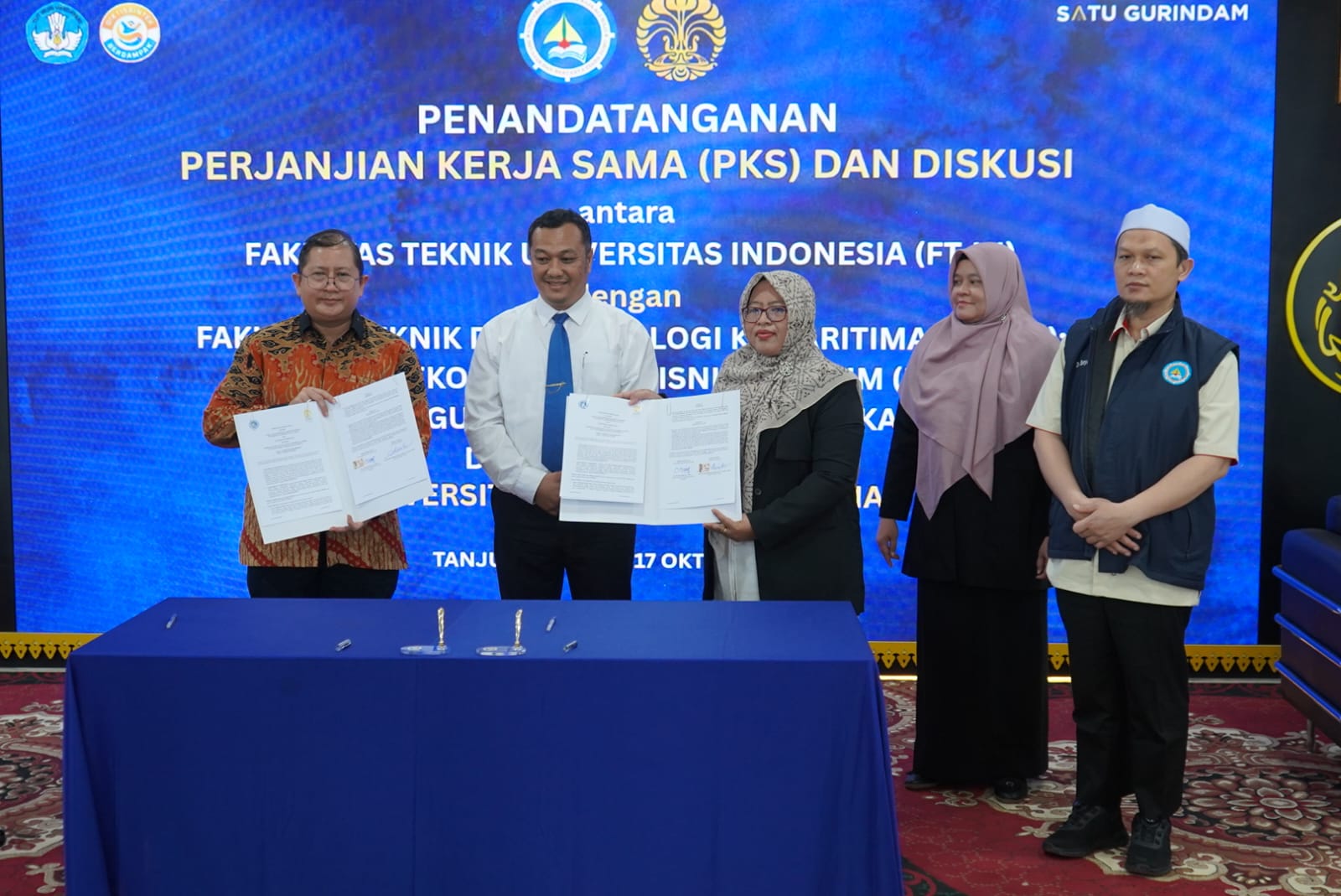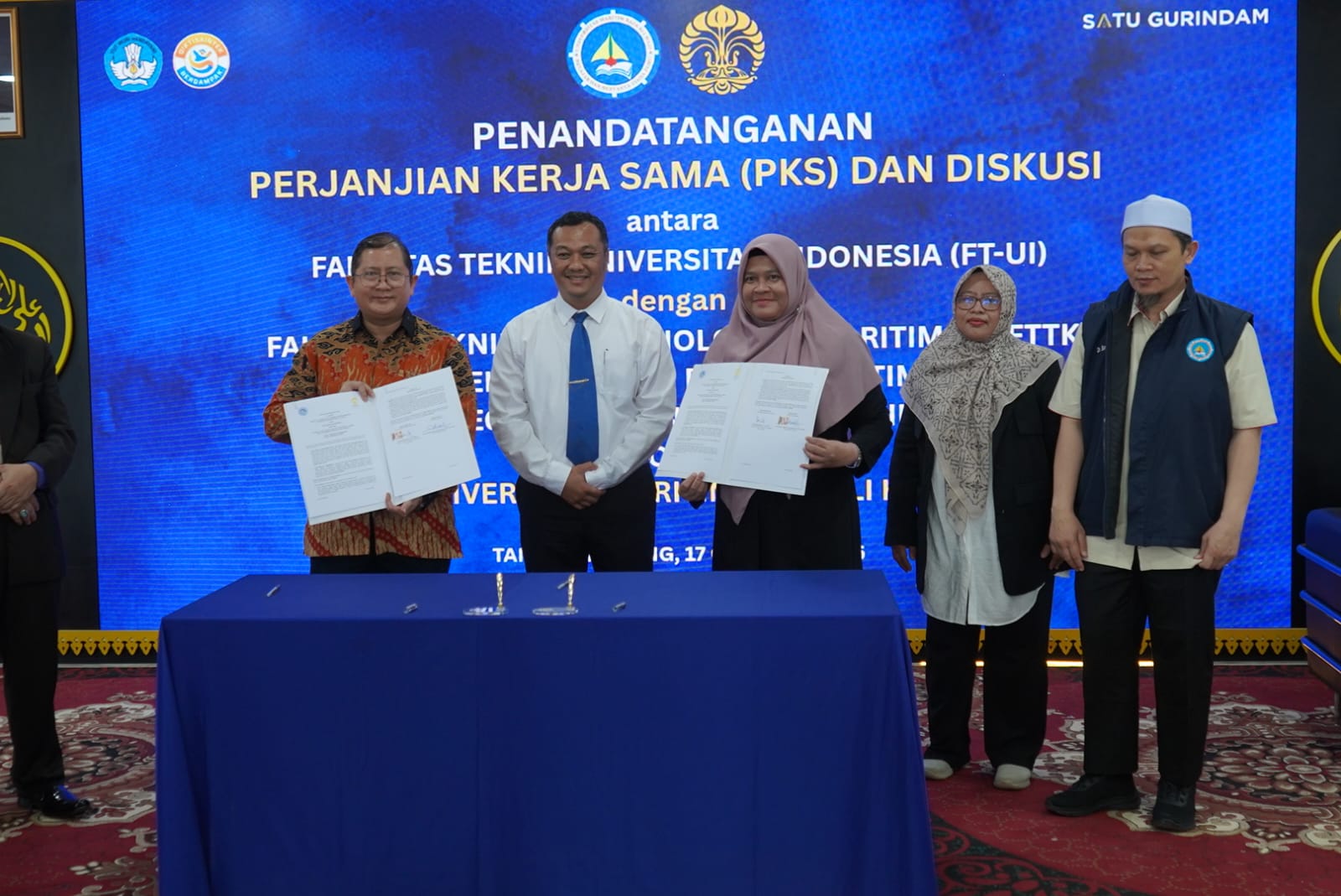The Faculty of Engineering, Universitas Indonesia (FTUI), has officially established a partnership with Universitas Maritim Raja Ali Haji (UMRAH) through the signing of a Cooperation Agreement (PKS) on Friday (17/10). This collaboration marks a strategic step in strengthening the implementation of the Tri Dharma of Higher Education, particularly in the preservation and mapping of intangible cultural heritage (ICH) in the Tanjungpinang region of the Riau Islands.
The agreement involves four faculties from UMRAH—the Faculty of Engineering and Maritime Technology (FTTK), the Faculty of Maritime Economics and Business (FEBM), the Faculty of Teacher Training and Education (FKIP), and the Postgraduate Program—with the Faculty of Engineering, Universitas Indonesia, as the main partner. The signing was carried out by the Dean of FTUI, Prof. Kemas Ridwan Kurniawan, Ph.D.; the Dean of FTTK UMRAH, Martaleli Bettiza, M.Sc.; the Dean of FKIP, Ahada Wahyusari, M.Pd.; and the Dean of FEBM, Dr. Myrna Sofia.
International Collaboration in Cultural Heritage Preservation
The initial implementation of this collaboration will take shape through an international-scale event titled International Workshop on Historic Urban Landscape (HUL): Mapping Intangible Heritage, which will be held in Tanjungpinang from November 30 to December 4, 2025.
This workshop will involve several national and international institutions, including Universitas Indonesia, Universitas Trisakti, IPB University, Universitas Brawijaya, the Cultural Heritage Agency of the Netherlands, and Heritage Hands On.
Prof. Kemas emphasized that this collaboration reflects FTUI’s commitment to fostering multidisciplinary cooperation relevant to the needs of cultural preservation in Indonesia.
“Through this partnership, FTUI aims to contribute not only to the technical aspects of mapping but also to building a multidisciplinary approach that integrates technology, economics, and social values. Mapping intangible heritage is not merely an academic activity—it is a manifestation of the university’s responsibility in safeguarding the nation’s cultural identity and sustainability,” said Prof. Kemas.
Furthermore, Prof. Kemas highlighted the importance of cross-disciplinary involvement from UMRAH.
“We are very open to collaboration among lecturers and students from various backgrounds, including economics and education, as the preservation of intangible heritage is closely related to social sustainability and the well-being of local communities,” he added.
Pulau Penyengat and Kota Lama Tanjungpinang as Primary Focus Areas
As an initial step, a field survey was conducted in two historical areas that will serve as the main focus of the workshop—the National Cultural Heritage Area of Pulau Penyengat and the Colonial Chinatown Area of Kota Lama Tanjungpinang.
The survey was carried out by Prof. Kemas Ridwan Kurniawan, accompanied by FTUI’s Manager of Cooperation, Dr. Muhamad Sahlan, UMRAH faculty members, and Riau Islands historian Aswandi Syahri. The team visited several heritage sites, including Masjid Raya Sultan Riau, the Tomb Complex of Engku Putri Raja Hamidah, and Istana Kantor, to identify the intangible values embedded within these spaces.
During the discussion session, UMRAH’s Deputy Director for Academic Affairs of the Postgraduate Program, Dr. Anastasia Wiwik Swastiwi, presented data on the intangible cultural heritage of the Riau Islands, categorized within the Framework of Cultural Advancement Objects, which serves as the conceptual foundation for mapping.
The Dean of the Faculty of Engineering and Maritime Technology (FTTK) UMRAH, Martaleli Bettiza, M.Sc., warmly welcomed this collaboration, emphasizing that FTUI’s involvement provides significant added value to UMRAH’s academic and research capacity-building efforts.
“We are very grateful for FTUI’s support, which brings a fresh perspective to cultural heritage preservation through scientific and technological approaches. This collaboration will be a milestone for UMRAH in developing research and community engagement based on maritime and local cultural values,” said Martaleli.
Through this partnership, FTUI and UMRAH are committed to positioning cultural heritage preservation as part of academic innovation with tangible social impact. The Historic Urban Landscape (HUL) approach applied in this program enables academics and students to view cultural heritage holistically—not only from its physical aspects but also from its narratives, social practices, and the values embedded within communities.
“The HUL approach offers a new perspective on heritage: one that does not separate buildings from the people who give them meaning. This collaboration is expected to become a concrete example of how universities can serve as agents of change in protecting and revitalizing the nation’s cultural values,” concluded Prof. Kemas.
***
Public Communication Office
Faculty of Engineering, Universitas Indonesia



